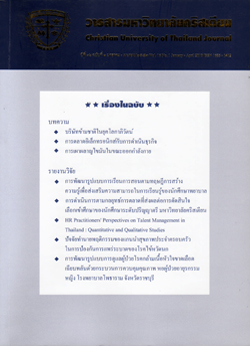มุมมองของนักบริหารทรัพยากรมนุษย์ต่อการบริหารจัดการคนเก่ง ในประเทศไทย : การศึกษาเชิงปริมาณและคุณภาพ
บทคัดย่อ
การวิจัยนี้มุ่ง (1) ศึกษาถึงการนิยาม และความเข้าใจเกี่ยวกับคนเก่ง และการบริหารจัดการคนเก่ง ตามแนวคิดของ Lewis และ Heckman (2006) ที่ได้รับการอ้างอิงจากนักวิชาการด้านทรัพยากรมนุษย์ทั่วโลก แต่ยังไม่มีการศึกษาวิจัยเช่นนี้ปรากฏตีพิมพ์ในประเทศไทยเลย และ (2) เพื่อนำเสนอปัจจัยที่มีผลต่อการจัดการคนเก่งอย่างมีประสิทธิภาพในองค์กรไทยตามมุมมองของนักบริหารทรัพยากรมนุษย์ ด้วยเหตุนี้มุมมองของนักบริหารทรัพยากรมนุษย์ในประเทศไทยที่มีต่อคนเก่ง และระบบการบริหารจัดการคนเก่งจึงเป็นประเด็นที่น่าสนใจแก่การศึกษาเป็นอย่างยิ่ง โดยการวิจัยนี้เก็บข้อมูลจากแบบสอบถาม จำนวน 400 ชุด และสัมภาษณ์เจาะลึกนักบริหารทรัพยากรมนุษย์ และผู้ที่เกี่ยวข้องกับประเด็นดังกล่าวในองค์กรภาครัฐและเอกชน จำนวน 40 คน ทั้งนี้ผลการศึกษาที่สำคัญพบว่า การบริหารและพัฒนาคนเก่งโดยใช้พรสวรรค์ส่วนบุคคลซึ่งเป็นประเด็นที่นักวิชาการทั่วโลกกำลังให้ความสนใจ เป็นองค์ความรู้ที่ยังขาดหายและเป็นที่ต้องการมากในวงการบริหารทรัพยากรมนุษย์ไทย นอกจากนี้นักบริหารทรัพยากรมนุษย์ต่างประสงค์จะได้รับความรู้ในประเด็นการจัดการนี้จากนักวิชาการและนักวิจัยเป็นอย่างยิ่ง ดังนั้นประเด็นนี้จึงควรจัดเป็นวาระเร่งด่วนที่นักวิจัยไทยควรให้ความสำคัญเพื่อสร้างองค์ความรู้ที่
เหมาะแก่ทิศทางการพัฒนาประเทศต่อไป
เอกสารอ้างอิง
Aston, C. & Morton, L. (2005). Managing talent for competitive advantage. Strategic HR review. 4(5) : 28 - 31.
Axelrod, B., Handfield-Jones, H., & Michaels, E. (2002). A new game plan for C players.Harvard business review. (January) : 81-88.
Bennett, M. & Bell, A. (2004). Leadership and talent in asia. Singapore : Wiley.
Berry, M. (2007). Talent management tops european challenges list. Perspective today.(June 19 ) : 8.
Birschel, D. (2006). Critical issues in HR drive: number1 is talent management. BenefitsQuarterly. 22(1) : 64.
Boston Consulting Group. (2007). The future of HR : key challenges through 2015. Dusseldorf : Boston Consulting Group.
Buckingham, M. & Clifton, D. O. (2001). Now, discover your strengths. New York : Free press.
Buckingham, M. & Vosburgh, R. M. (2001). The 21st century human resources function.It's the talent, stupid!. Human resource planning. 24(4) : 17 - 23.
Cappelli, P. (2008). Talent management for the twenty-first century. Harvard businessreview.(March) : 74 - 81.
Chugh, S. & Bhatnagar, J. (2006). Talent management as high performance work practice : emerging strategic HRM dimension. Management labour studies. 31(3) : 228 - 253.
Collings, D. G. & Mellahi, K. (2009). Strategic talent management : a review and researchagenda. Human resource management review. (19) : 304 - 313.
Economist Intelligence Unit. (2006). The CEO's role in talent management : how top executives from ten countries are nurturing the leaders of tomorrow. London : The economist.
Goffee, R. & Jones, G. (2007). Leading clever people. Harvard business review. (June) : 72 - 79.
Green, K. W., Wu, C., Whitten, D., & Medlin, B. (2006). The impact of strategic humanresource management on firm performance and HR professionals' work attitudeand work performance. International journal of human resource management. 17(4) : 559 - 579.
Groysberg, B., Nanda, A., & Nohria, N. (2004). The risky business of hiring stars.Harvard business review.(May) : 92 - 100.
Huselid, M. A., Beatty, R. W., & Becker, B. E. (2005). A players or A positions : the strategic logic of workforce management. Harvard business review. (December) : 110 - 117.
Ingham, J. (2006). Closing the talent management gap. Strategic HR review. 5(3) : 20 - 23.
Jenkins, M. (2006). Managing talent is a burning issue in asia. Leadership action. 26( 5) : 20.
Kuptsch, C. & Pang, E. F. (2006). Competing for global talent. France : ILO Publications.
Lewis, R. E. & Heckman, R. J. (2006). Talent management : a critical review. Human resource management review. (16) : 139-154.
Maxwell, G. A. & MacLean, S. (2008). Talent management in hospitality and tourism inScotland : Operational implications and strategic actions. International journal of contemporary hospitality management. 20(7) : 820 - 829.
McCauley, C. & Wakefield, M. (2006). Talent management in the 21st century : Help your company find, develop and keep its strongest workers. Journal of quality & participation. 29(4) : 4 - 7.
Michaels, E., Handfield-Jones, H., & Axelrod, B. (2001). The war for talent. Boston : Harvard business school press.
Morton, L. (2004). Integrated and integrative talent management : a strategic HR framework, Research report R-1345-04-RR. New York : The conference board.
Onishi, J. (2006). The transferability of japanese HRM practices to thailand. Asia pacific journal of human resources. 44(3) : 260.
Petison, P. & Johri, L. M. (2007). Developing local talent in international subsidiaries : The importance of trust and respect in toyota. Development and learning inorganizations. 21(3) : 10-13.
Phillips, D. R. & Roper, K. O. (2009). A framework for talent management in real estate.Journal of corporate real estate. 11(1) : 7 - 18.
Piansoongnern, O., Anurit, P., & Bunchapattanasakda, C. (2008). Managing talented Employees : a study of leading corporation in europe. European journal of social sciences. 6(1) : 70-90.
Powell, M. & Lubitsh, G. (2007). Courage in the face of extraordinary talent. Strategic HR review. 6(5) : 24 - 27.
Rath, T. & Conchie, B. (2008). Strengths-based leadership : great leaders, teams, and why people follow. New York : Gallup press.
Ready, D. A. & Conger, J. A. (2007). Make your company a talent factory. Harvard business review. (June) : 68 - 77.
Redford, K. (2005). Shedding light on talent tactics. Perspective today. (September) : 20 - 22.
Roberts, L. M., Spreitzer, G., Dutton, J., Quinn, R., Heaphy, E., & Barker, B. (2005). How to play to your strengths. Harvard business review. 83(1) : 75.
Tansley, C., Harris, L., Stewart, J., & Turner, P. (2006). Talent management : understanding the dimensions. The chartered institute of personnel and development (CIPD : 1 - 25.
Wattanasupachoke, T. (2009). Strategic human resource management and organizational Performance : a study of thai enterprises. Journal of global businessissues. 3(2) : 139-148.
Yeung, A. (2006). Setting people up for success : how the portman ritz-carlton hotel gets the best from its people. Human resource management. 45(2) : 267.
Zheng, C. (2009). Keeping talents for advancing service firms in asia. Journal of service management. 20(5) : 482 - 502.
Zheng, C., Soosay, C. & Hyland, P. (2008). Manufacturing to asia : who will win the emerging battle for talent between dragons and tigers? . Journal of manufacturing technology management. 19(1) : 52.



